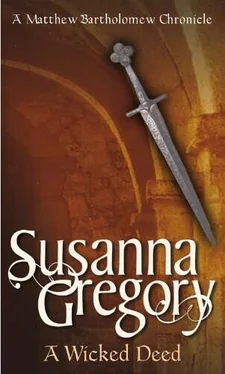Susanna Gregory - A Wicked Deed
Здесь есть возможность читать онлайн «Susanna Gregory - A Wicked Deed» весь текст электронной книги совершенно бесплатно (целиком полную версию без сокращений). В некоторых случаях можно слушать аудио, скачать через торрент в формате fb2 и присутствует краткое содержание. Год выпуска: 2010, ISBN: 2010, Издательство: Little, Brown Book Group, Жанр: Исторический детектив, на английском языке. Описание произведения, (предисловие) а так же отзывы посетителей доступны на портале библиотеки ЛибКат.
- Название:A Wicked Deed
- Автор:
- Издательство:Little, Brown Book Group
- Жанр:
- Год:2010
- ISBN:9780748124411
- Рейтинг книги:3 / 5. Голосов: 1
-
Избранное:Добавить в избранное
- Отзывы:
-
Ваша оценка:
- 60
- 1
- 2
- 3
- 4
- 5
A Wicked Deed: краткое содержание, описание и аннотация
Предлагаем к чтению аннотацию, описание, краткое содержание или предисловие (зависит от того, что написал сам автор книги «A Wicked Deed»). Если вы не нашли необходимую информацию о книге — напишите в комментариях, мы постараемся отыскать её.
A Wicked Deed — читать онлайн бесплатно полную книгу (весь текст) целиком
Ниже представлен текст книги, разбитый по страницам. Система сохранения места последней прочитанной страницы, позволяет с удобством читать онлайн бесплатно книгу «A Wicked Deed», без необходимости каждый раз заново искать на чём Вы остановились. Поставьте закладку, и сможете в любой момент перейти на страницу, на которой закончили чтение.
Интервал:
Закладка:
The villagers seemed in high spirits, something that had been conspicuous by its absence in most of the settlements they had passed since leaving Cambridge. The plague had hit rural England hard, and many people, tied by law to the lord of the manor in which they were born, were no longer able to scrape a decent living from the land. To see folk well fed and adequately clothed, and even with spare pennies to squander on the useless trinkets that a chapman was hawking on the green, was a pleasant and unexpected change.
Bartholomew’s teaching, his patients and his half-finished treatise on fevers seemed a long way away as he watched Grundisburgh’s villagers celebrate their Pentecost Fair. Some of the younger people were dancing to the musicians’ furious music, skipping and weaving around each other playfully, and calling for others to join in. Bartholomew was about to yield to the persistent demands of one pretty flaxen-haired girl and be her partner in a jig, when a sharp cry from Dame Eva made him glance at her in surprise.
‘Barchester? You came through Barchester?’
The old lady and Isilia exchanged a significant glance, and Isilia shifted closer to her mother-in-law, as if for the comfort of physical contact. Michael, who had been about to describe the clothes in the otherwise deserted village, regarded them uncertainly, while Bartholomew’s golden-headed maiden backed away hurriedly at the mention of the plague village, and ran to find another man with whom to dance.
‘That was the way the path ran,’ said Michael, watching the girl leave with unmonklike interest. ‘Have we done something wrong? Trespassed unknowingly on someone’s land?’
‘Barchester belongs to no one,’ said Isilia, in a hushed voice.
‘No one would have it,’ added Dame Eva, crossing herself vigorously.
‘Actually, it stands on my land,’ said Tuddenham, a touch impatiently. ‘Near the boundary with Otley. It was abandoned after the plague, and all sorts of silly stories have grown up about it. The only people who visit it these days are travellers, like you, who do not know that the locals use the new track to the east, to avoid it.’
‘It is a village that the plague destroyed,’ whispered Isilia, her eyes wide as she moved closer still to Dame Eva. ‘It is a haunted place, and no one from around here would set foot in it under any circumstances.’
‘Nonsense, my dear,’ said Tuddenham. ‘It is just like any other of the plague villages in the shire — a poor, sad place that the Earth is slowly reclaiming.’
‘It is one of the gateways to hell,’ announced Dame Eva uncompromisingly, crossing herself again. ‘Only the damned willingly go there — in the darkest hours near midnight, in order to commune with the Devil.’
‘There was nothing to be afraid of,’ said Michael, not entirely truthfully, since, by his own admission, the village had unnerved him. ‘Matt even looked in one of the houses, and there was nothing amiss.’
‘You went into a house?’ asked Isilia, aghast. She flinched away from Bartholomew, as though his very presence might prove contaminating. ‘You touched a threshold?’
‘I looked inside,’ said Bartholomew. ‘There was nothing sinister or terrifying there — just a few old vegetables on the table, and some clothes in the doorway.’
Dame Eva and Isilia exchanged more frightened glances. ‘They must have been Mad Megin’s clothes,’ said Dame Eva. ‘She drowned herself last winter because Barchester sent her insane.’
‘She drowned herself because she was a lonely old woman who had lost her family and friends,’ explained Tuddenham impatiently. ‘You see how these stories become exaggerated? Megin was the only Barchester resident not taken by the pestilence, and one of our villagers — Tobias Eltisley, the landlord of the Half Moon — found her floating in the river just after Christmas.’
‘He buried her in Barchester’s churchyard,’ said Isilia fearfully, ‘and it is said that she leaves her grave each night to wander the village, calling for her loved ones.’
‘A sad tale indeed,’ said Michael brusquely, never a man much interested in local stories and folklore. ‘But we escaped from Barchester unscathed to arrive here in one piece.’
Tuddenham smiled reassuringly at his nervous womenfolk, and nodded to the festivities on the green. ‘Let’s not discuss Barchester while the Fair is in full swing. You arrived at an opportune time, gentlemen. At sunset, we will all eat the food the villagers have provided to mark the Fair’s beginning; on Monday, I, as lord of the manor, will provide the feast that marks the end of the celebrations. It is a tradition that goes back many years.’
‘It does not seem to be a religious occasion, Sir Thomas,’ observed Father William, eyeing the villagers reprovingly. ‘It looks more like pagan revelry to me.’
‘Roger Alcote took the wrong turning at the crossroads,’ said Michael quickly, changing the subject before the fanatical friar could antagonise their benefactor. ‘But he should be here soon.’
Tuddenham was concerned. ‘It is not wise for a man to be travelling alone these days. Outlaws are as numerous as the stars in the sky along the roads to Ipswich.’
‘He is not alone,’ said Michael to allay his fears. ‘The students are with him.’
‘Students?’ asked Tuddenham uneasily. ‘How many Michaelhouse scholars did you bring?’
‘We are seven, plus our servant, Cynric,’ said Michael.
Dame Eva raised her eyebrows. ‘That is quite a deputation,’ she remarked bluntly. ‘We were expecting Alcote, a scribe and the lad who will be our priest when Master Wauncy retires. We had no idea that to draft an advowson would require seven scholars. No wonder honest men avoid the law when they can — it promises to be an expensive business!’
‘Mother, please!’ said Tuddenham, embarrassed. He smiled unconvincingly at Michael. ‘It is true that we were not anticipating such a number, but you are all welcome, nonetheless.’
The number of scholars to visit Grundisburgh had been a matter of fierce debate at Michaelhouse’s high table for several weeks before their departure. If too few people went, it would appear as if the College did not appreciate the magnitude of Tuddenham’s generosity; if too many went, the knight might feel his hospitality was being imposed upon. At the same time, none of the Fellows, with the sole exception of Alcote, wanted to go themselves, but none of them trusted him to draft out the deed without taking the opportunity to negotiate a little something for himself — either to the College’s detriment or to prey on Tuddenham’s kindness.
In the end, the Master had made a unilateral decision, and had dispatched William and Bartholomew to monitor the avaricious Alcote, and Horsey to keep the nervous Unwin company. Deynman had been an afterthought, to remove him from harm until the temper of Agatha, the College laundress, had cooled over the business regarding her teeth. Michael, meanwhile, had been seconded to the deputation by the Chancellor, to see whether Tuddenham’s generosity might be further exploited in the University’s interests.
Michael smiled ingratiatingly at Tuddenham. ‘Master Kenyngham dispatched not only his four most senior Fellows to acknowledge your handsome gift, but three of his finest students.’
Bartholomew winced, hoping Tuddenham would not embark upon any lengthy discussions with the woefully unacademic Rob Deynman. There was not another student in the entire University who was in Deynman’s league for atrocious scholarship, and even after three years of painstaking care and effort on Bartholomew’s part, Deynman remained as cheerfully ignorant as on the day he had arrived.
Читать дальшеИнтервал:
Закладка:
Похожие книги на «A Wicked Deed»
Представляем Вашему вниманию похожие книги на «A Wicked Deed» списком для выбора. Мы отобрали схожую по названию и смыслу литературу в надежде предоставить читателям больше вариантов отыскать новые, интересные, ещё непрочитанные произведения.
Обсуждение, отзывы о книге «A Wicked Deed» и просто собственные мнения читателей. Оставьте ваши комментарии, напишите, что Вы думаете о произведении, его смысле или главных героях. Укажите что конкретно понравилось, а что нет, и почему Вы так считаете.












